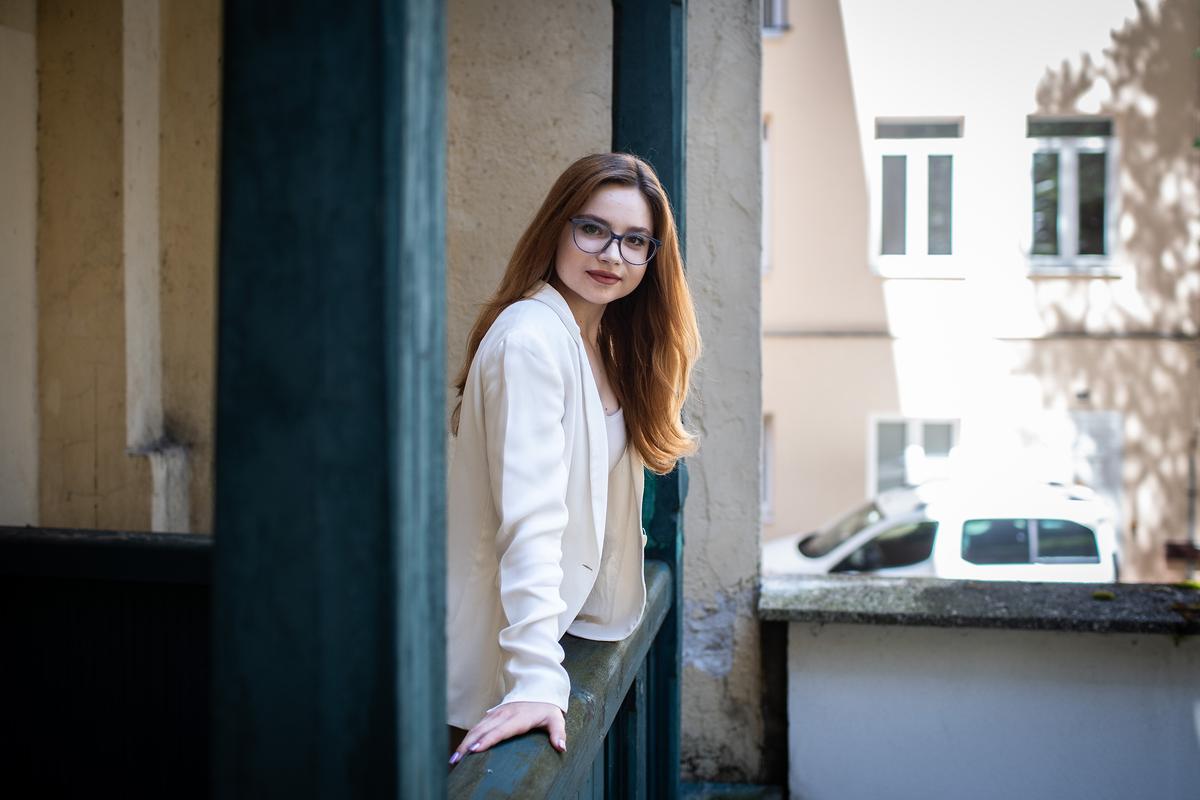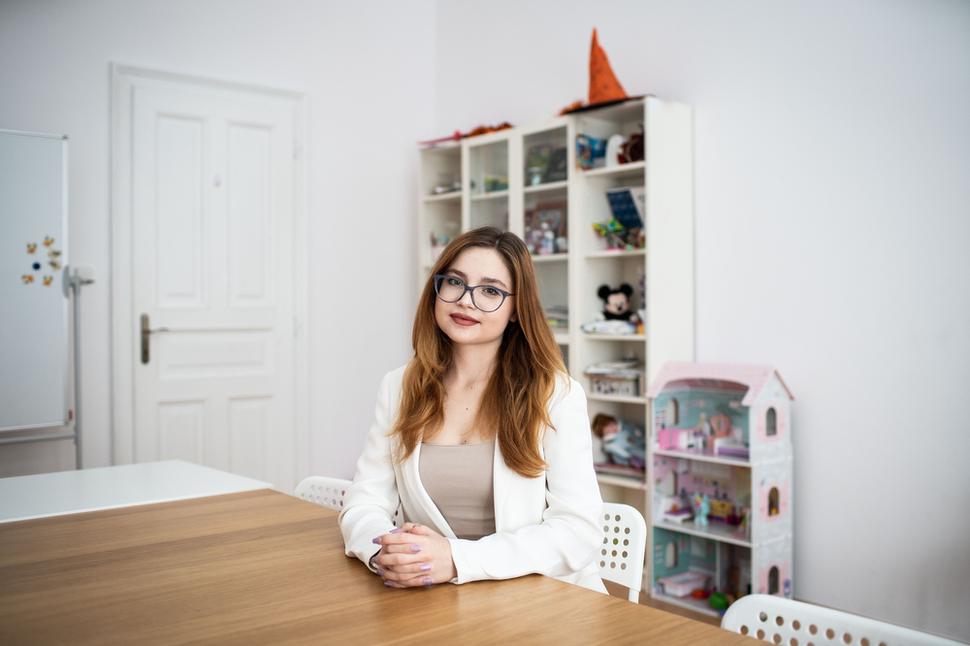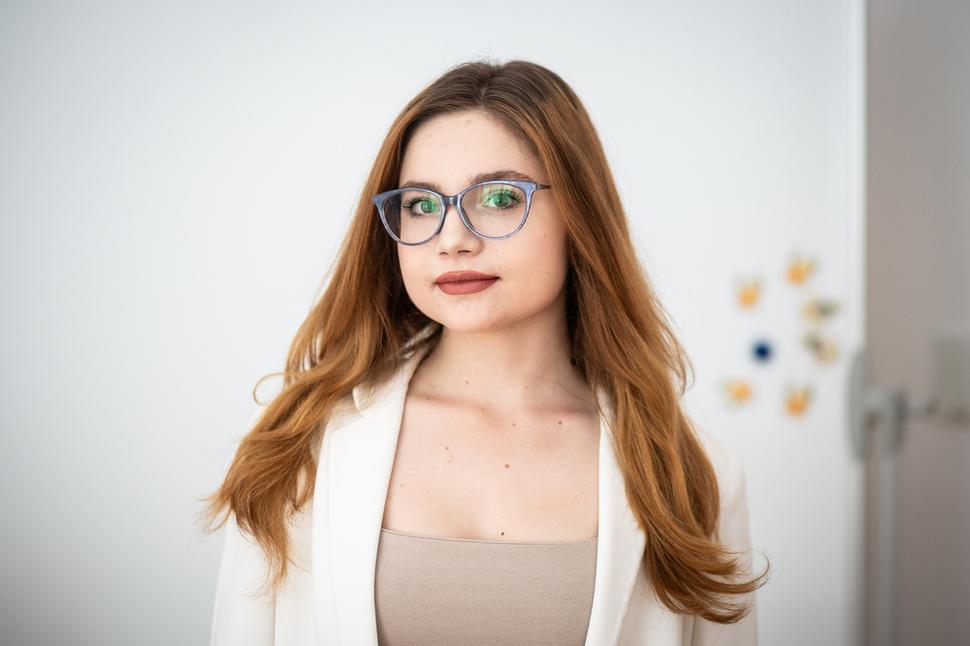Taisiya Kosterina comes from Kostyantynivka, a major industrial city in the Donetsk region. Its factories, once full of life, have become famous for producing high-quality glass, which also adorns Moscow’s metro stations.
Today, the city, located 70 kilometres from the capital of the Donetsk region, is near the front line. Pro-Russian separatists seized it as early as the spring of 2014, for four months. In July 2014, the Ukrainian army recaptured the city.
But the all-out war that began in February 2022 is still roiling in Kostyantynivka to this day.
“Donetsk has been bombed since 2014 or for almost a decade. One can get used to it to a certain extent. Children were being born and people were organising weddings, just living,” Taisiya recalls of her home.
At the same time, she adds that things are different in the city today.
“It’s not peaceful, there are only two schools and two kindergartens remaining, lots of places are destroyed,” she notes sadly.
New house and replaced dreams
Taisiya comes from a large family of six and a dog. For a long time, they lived in a flat that was already too small for them. They bought an older house before the war, which they started renovating.
“The glass on the older windows is now cracked, but the house is still standing. We still have a cottage, although it’s a bit broken as well. The flat is still standing,” she lists how the war has impacted the places they will hopefully one day return to.
Kostyantynivka had a population of about 90,000 before the war and was full of pupils and students. Taisiya was one of them. The town had not only primary and secondary schools, but also a technical college.
At that time, a 17-year-old student was finishing secondary school and thinking about what she wanted to do in life. Most of all, she wanted to become independent.
“I was dealing with exams, plans on where to go after finishing school, who I wanted to be. I really wanted to be independent of my parents, financially as well, I wanted to move out, get a job. My favourite city in Ukraine is Kharkiv, I really wanted to study and live there,” she says.
As a child, she aspired to be a singer or actress. She sang for 12 years. Later, her dreams changed. She planned to study pedagogy – similar to her mother, who taught history at the school Taisiya attended. She saw herself as a teacher of Ukrainian.
Bratislava instead of Kharkiv
Currently, she lives with her family in Bratislava. “My mother’s name is Tatiana, we work together. My father Sergiy is a construction worker. My younger sister Katarina is 17 years old and attends a secondary art school. My younger brother Pavol is 12 years old, and the youngest Lyda is eight. They go to primary school,” she introduces the people closest to her.
“Lyda was certainly the quickest to adapt. She is a child, children quickly get used to new surroundings. My father takes it the hardest. He has been living with us for a year, but he finds Slovak difficult. His comprehension is good, but he doesn’t speak much,” she adds.
Her father also works as a construction worker in Slovakia, in a group with other guys from Ukraine. He represents the only stable income for the family. Both Taisiya and her mother have a job secured until the end of June.
“At the beginning we were terribly stressed, we didn’t know how to survive here. Where would we go, what would happen tomorrow, where would I work so that we can survive? We partly got used to it. But nothing is fully stabilised, my project here will end (Taisiya works alongside her mother in the Gunduličova community centre, ed.) and I will have to look for a job again. It’s not easy,” she assesses harshly and honestly.
Four days on the train
Taisiya arrived in Slovakia two months after the war broke out. “I arrived with my younger brother, my sisters and mother. My father didn’t arrive until a year later,” she explains.
Grandma and grandpa are still in Ukraine. They did not want to come because of their age, and also because they did not want to leave the place where they spent their lives. Her great-grandmother, who can no longer go anywhere, is also alive.
Taisiya explains that the transport of an old person in wartime conditions is life-threatening. “She might not have survived such a long journey. We rode the train four days. There were twelve of us in a place meant for four. It's very far and the journey from both Luhansk and Donetsk is extremely difficult. All those who came from there are our heroes,” she adds, noting how difficult it was for them as young people.
However, Taisiya’s grandmother was in Slovakia, for two weeks. “She said she couldn’t do it, she couldn’t adapt, she didn’t want to leave her hut, house or flat,” Taisiya says.
When she recalls leaving in April 2022, she uses the adjective incomprehensible.
“We joked that we were leaving for a month, that everything would be over and we would return home. We left home with one bag containing jeans, a t-shirt, and documents,” she describes their initial mindset. The rest of the necessary items and those important to them as memories were gradually sent by their grandmother in packages.
Originally, they planned to stay in Uzhhorod. However, in a few hours they decided on Slovakia. According to Taisiya, no place in Ukraine is completely safe. Nevertheless, not only did her grandparents stay there, but also some friends.
The mindset of those who stayed behind
“For example, I didn’t want to come because I have many friends in Ukraine, we have a house and grandparents there, and I didn’t know what I would do when we moved here. Would I be like a homeless person? Sitting outside and asking for money?” she explains.
She believes this is the reason why many people are afraid to leave. They do not know what they will encounter in Slovakia. She did not want to head elsewhere and rely on the help of others.
Their acquaintances who decided to leave are in Europe, one friend in the United States.
“We are still in contact with those who stayed. We talk every day to see how they are feeling, if everything is alright. Teenagers feel a lot of responsibility, especially if they have younger siblings, it’s very difficult and challenging for them,” Taisiya replies.
She adds that in the beginning, every conversation was full of pressure, they often called each other and repeatedly asked if everything was okay, if they had light and food at home. Now it is a little different. After more than two years under Russian bombardment, people have partially adjusted.
It is still challenging, and the conversations are far from normal. “I might call a friend and she’ll tell me they’ve had their house smashed up. It can happen to anyone at any time. We don’t know what’s going to happen tomorrow. It’s hard for Slovaks to understand,” Taisiya thinks.
Panic attack
Coming to Slovakia was extremely demanding on the psyche. The family’s first place was a sports complex, not intended for accommodation. They stayed there for two weeks.
Taisiya slept very little, had a sense of responsibility for her mother and siblings, and was under constant stress. A panic attack arrived. At that time, a conversation with a psychologist at the help centre for Ukrainians helped her.
“She helped me get rid of that feeling and understand that it wasn’t going to be easy, and I had to adjust to the new environment. After just one conversation I felt better,” she recalls.
At the help centre for Ukrainians on Bottova Street in Bratislava, they helped them find a place to live, get their bearings, and guided Taisiya’s mother, Tatiana, on how to get to the labour office and find a job. The volunteer who took care of them is now their friend.
Taisiya started helping at the centre on Bottova Street, and now she helps at the community centre on Gunduličova Street. The war has also changed who she wants to be. She wants to study therapeutic pedagogy.
“I will be able to help seniors and teenagers, work with autistic and traumatised people, or just those who have experienced some stress. We are involved in music therapy, art therapy and bibliotherapy,” she describes her new plans.
“I realised that I had to choose something like psychology, something that would have an impact on a lot of people,” she adds.
Seniors during the day...
The community centre on Gunduličova Street opens in the morning at nine o’clock. Taisiya arrives earlier. The calendar on the wall is filled with activities from morning until evening.
They help the elderly to find humanitarian aid, engage them in creative activities from crocheting to an intellectual club where they train their memory or develop their motor skills. They also offer language courses - Slovak and English conversation.
“We have two psychologists in the next room. Other colleagues went with our seniors on an excursion today. We’ve had Slovak seniors here before as well. They meet Ukrainian ones, have fun together, they see the difference between cultures, and so our seniors adapt better and can start to really live,” Taisiya says.
According to her, seniors in particular are a very sensitive group of refugees. They find it harder to learn the language, and they cannot work. They also have problems with the Slovak healthcare system, different from the one in Ukraine. The centre also helps them find doctors.
Seniors come to the centre on Gunduličova Street not only from Bratislava, but from everywhere in the region. They have already received an award for their work with Ukrainian refugees. However, they work with migrants from all over the world.
...children in the afternoon with homework
In the afternoon, seniors switch places with children and teenagers in the centre. The children either prepare for school or have tutoring lessons.
“I run a teenage group here,” Taisiya indicates the door of one room.
They watch movies, go on field trips, play games, even in Slovak. This is the group closest to her heart; working with them truly fulfils her.
Thanks to the centre, Taisiya already has many friends among Slovaks. Bratislava reminds her of Kharkiv, and she has found a second home here.
“I got used to the bus I take to work every day, to the streets in the city,” she describes her routine.
Will I come back?
At home, they talk about the war and its end daily. Just as at first they thought it would be over in a year or two, today she says it could be in five. “I don’t know whether I will return to Ukraine completely. I would like to be here and there,” Taisiya says.
Her parents definitely want to return, and her younger siblings will return with them. Taisiya is not so sure about the middle child, Katarina, anymore. “She has her secondary school here, friends, a chance for education and another life. And in Ukraine? We don’t know what will happen there, we will have to rebuild or reconstruct everything,” she explains.
The news from her native Donetsk flows in every day. Taisiya says that she has days when she feels the inability to follow it. She puts down her phone and does not answer messages. In the mornings, the usual hustle and bustle of a big family helps her to do so, when the children are not in time for school and the house is hectic, and during the day she works. But in the evening, time usually overpowers her. She wants to know if their house is standing, how her grandparents are doing. Every evening, the whole family calls through FaceTime.
“Even when I see the news from the city, we immediately call my grandmother to see if everything is okay, where they are. We’re scared,” she says.
There has not been a day in more than two years that they have not thought about the war. “We don’t know who is better off, us or the Ukrainians who stayed behind,” she adds bitterly.
She describes how they did not even celebrate Easter for two years, an important holiday for her family. “We are in a foreign country. We sat down and could not make ourselves do it. I’ve even partially lost my memories of what it was like in my city. It’s going to be a shock for me when it’s over and I go back home. But I’d like to walk our streets and remember what it was like,” she says.
“We all have different ideas, different beliefs, but everyone can relate to what we encountered. If someone in Slovakia has a problem, Ukrainians will help, and that’s how it has to work, because we are human,” Taisiya is clear about that.
This story was produced with the support of UNESCO under the Support for Ukrainian Refugees Through Media programme, funded by the Japanese government.
© Sme



